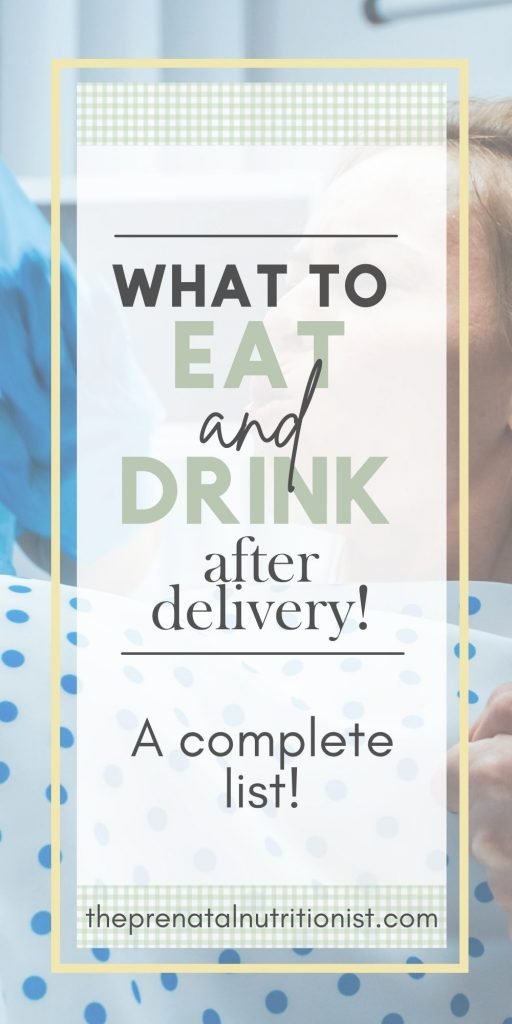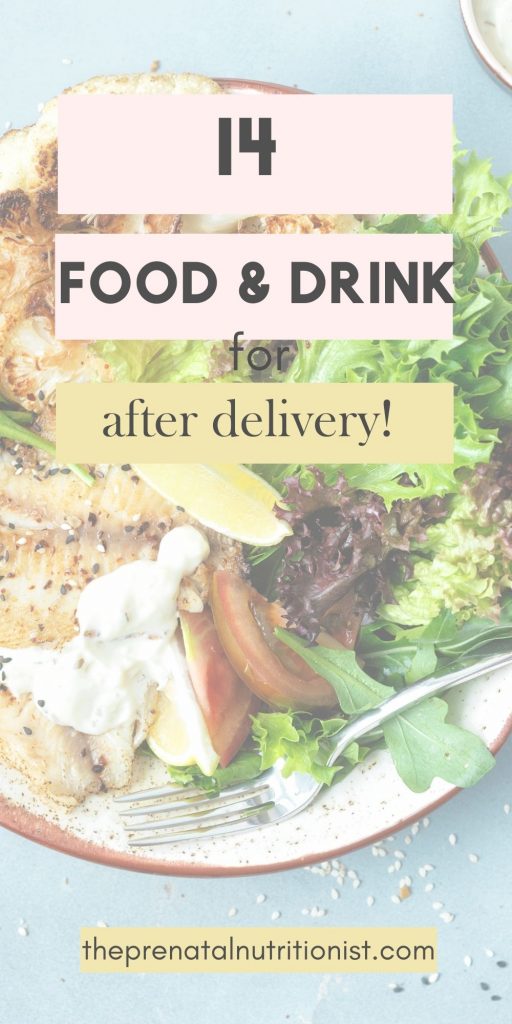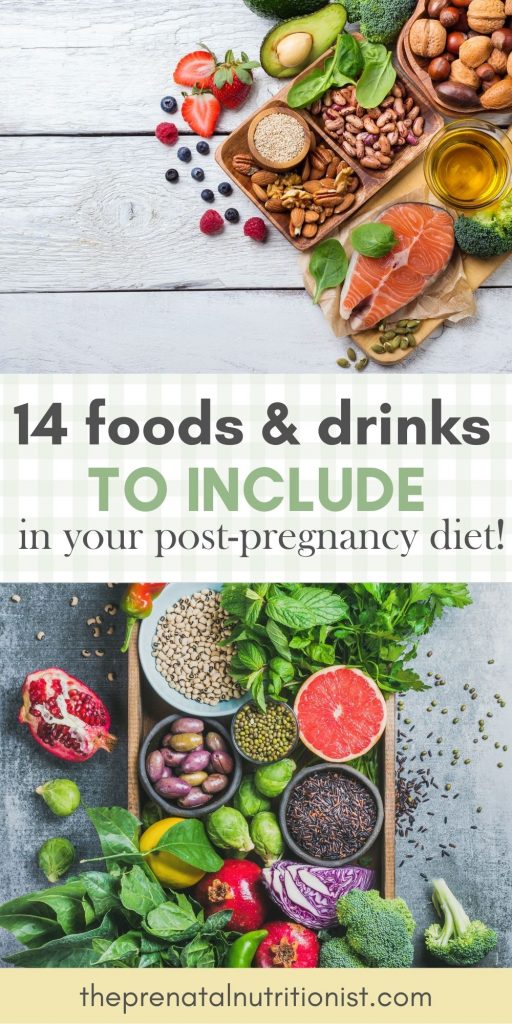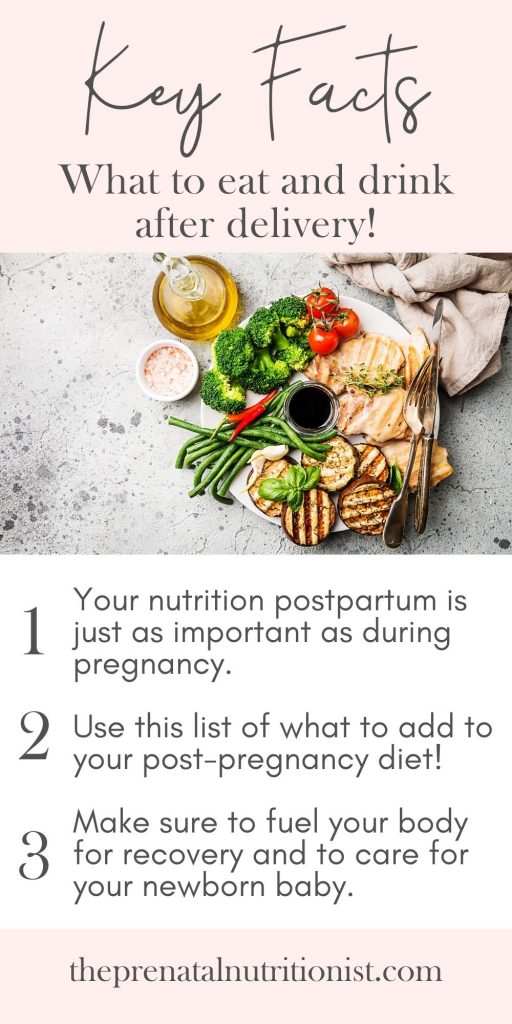
Welcoming a baby into this world is miraculous, but childbirth can be physically and mentally exhausting! And the post-pregnancy process can be really overwhelming. It’ll take some time to get adjusted to your new routine. Your body needs plenty of energy to recover, produce breast milk, and care for your baby. For these reasons and more, your nutrition postpartum is just as important as your nutrition during pregnancy.
Providing nourishment for two people doesn’t stop once the baby is born; you are still growing your precious babe. It’s still very important to take in the key vitamins and minerals during the postpartum period! This is not the time to focus on how you will lose weight, instead, we want to replenish what your body utilized to grow a baby.
Studies show many new moms are often deficient in vitamin D, iron, folate, and other important nutrients. Focusing on simple meals with the right food and drinks can boost your energy levels and keep you and your baby healthy! So, today’s post is dedicated to the items you must include in your post-pregnancy diet. Keep reading for my roundup of what to eat and drink after delivery!

What To Eat And Drink After Delivery
Water
This one is a no-brainer, but you’d be surprised how many adults don’t drink enough water daily! As you probably know, you should increase your water intake during pregnancy. Fluids are still just as important after delivery, though. Remember that the recommended amount for adults is eight 8-ounce glasses per day. And, if you’re breastfeeding in any capacity, that amount should go up by at least two extra glasses per day, if not more. If you’ve breastfed before, you know just how thirsty you will get! Staying adequately hydrated is one of the key nutrition factors to producing sufficient milk.
Oatmeal
It’s safe to say that oatmeal is often a staple for a healthy breakfast selection! Not only does it have a plethora of health benefits, but it’s also extremely rich in fiber. And, guess what fiber is great for? To stimulate bowel movement. Yep, oatmeal can help keep pesky postpartum constipation at bay. If you like oatmeal, consider eating it in the morning or as a snack later on.
You may have heard oatmeal or oats can help increase breast milk supply, and unfortunately, this is not supported by science. Some moms swear by it, while others see no impact on their supply from including oats regularly. But, as mentioned above, oats are still a healthy choice after delivery.
Fish
Fish is well-known as one of the healthiest protein choices during any stage of life. And pregnancy and postpartum are definitely no exception. Fish is the best source of omega-3’s, specifically DHA, in our diets, and this nutrient is crucial in developing your baby’s brain both in the womb and when they are out. Additionally, fish is a good source of vitamin D and iodine, two nutrients that are important to ensure a safe recovery after delivery. And your breast milk is high in these nutrients.
Bone Broth
Bone broth is an excellent choice for a post-delivery drink or broth in your soup. It’s the food everyone clings to when they feel their immune system flickering. And don’t even get me started on the benefits of drinking bone broth while pregnant! All pregnant moms should add bone broth to their diet. But the positive impact of bone broth doesn’t stop there. You should keep drinking it during the postpartum period! Bone broth is a great source of collagen needed to help you recover from childbirth. Not only that, but it is a very warming food which in traditional cultures is what the postpartum diet should mainly consist of.
Meats
Sticking to the basics is a great choice when planning your post-pregnancy diet, i.e., including adequate protein at every meal. Meat is extremely high in nutrients like B12, iron, zinc, vitamin A, and more which are all needed in higher amounts once the baby arrives. In fact, including meat regularly in your diet is a great way to ensure you are both replenishing your stores after growing a baby for 9 months and supplying the baby with these nutrients through breast milk. Any variety of beef, pork, chicken, or turkey is a great option!
Leafy Greens
Well, we know fruits and veggies are always a good choice! And, leafy greens are a solid food to keep in the fridge at all times! They’re high in B6, vitamin C, potassium, fiber, and folate. All of these are key nutrients lactating women should make sure to eat enough of! You can get in leafy greens by making green smoothies and salads or adding them to soups and stews.
Whole-Grain Bread
Grains are an important source of complex carbohydrates, folic acid, and fiber. All of these are nutrients you should include in your diet every day! Whole-grain bread, sprouted grain bread, or sourdough bread are all great options to quickly whip up or have someone else whip up a sandwich or toast after you deliver. Whole-grain consumption is consistently linked to positive health outcomes, so include it in your diet in moderation like many other foods!
Eggs
If you follow along on social media, you know I love eggs for pregnancy, which extends to after the baby arrives. Egg yolks are one of the best sources of choline which, surprisingly your needs are even higher after you deliver the baby! The amount of choline you take in is directly related to your breast milk, so this nutrient is still important to focus on. The good news is that eggs are extremely versatile and can be made in a matter of a few minutes or hard boil a full dozen before you head to the hospital!
Dairy Products
Pasteurized dairy products are an excellent source of many nutrients new moms require more after delivery. Foods like yogurt, milk, and cheese are great sources of calcium, iodine, protein, and all B vitamins. They’re also amazing for lactating women! This is thanks to how newborns absorb calcium from the breast milk supply for bone development. So, you need all the extra calcium you can get to replace the one destined for your baby!
Brown Rice and Quinoa
Brown rice is an excellent whole grain, and while quinoa is actually a seed, it functions more like a grain in our diets. I mentioned the importance of whole grains earlier on, but brown rice is such a versatile food that deserves its own mention. It’s high in B vitamins, magnesium, and manganese making it very nutritious despite all the bad publicity rice gets!
Both quinoa and brown rice are great carb choices post-delivery and as you extend into the postpartum period. Besides having notable health benefits, quinoa is higher in protein! Post-delivery is not the time to cut carbs but instead, welcome them with every meal. Making any drastic changes to your diet can impact your milk supply.
Legumes
I couldn’t leave legumes out of this list! They’re a vegetable source of protein and perfect for maintaining energy levels during lactation. A few of my favorite legumes are kidney beans, black beans, and lentils. Lentils are a good source of iron which is needed in higher amounts after you’ve given birth, especially if you lost blood. Legumes are also high in fiber, essential to ensuring your bowel movements are less painful after the baby arrives.
Sweet Potatoes
Sweet potatoes are incredible for both during and after pregnancy. They are complex carbohydrates, absolutely delicious, and considered a functional food, foods that have a superior effect on our health beyond the basics. A serving is a wonderful source of vitamin C, phosphorus, beta-carotene, sodium, and potassium! So, they are actually a great way to replenish the electrolytes lost during childbirth. Load up on sweet potatoes postpartum, and eat sweet potatoes during pregnancy, if you are still waiting for the baby’s arrival!
Nuts and Seeds
Healthy fats are essential in your diet after birth, and nuts and seeds are a great way to get them in. There are many nut types to choose from, so feel free to create your trail mix at home. From cashews to almonds, they’re all equally delicious and nutritionally rich. If you’re allergic to nuts, seeds are great to include in your diet regularly! Seeds have many different health benefits depending on which type you consume. But they have been generally linked with a decreased risk of cancer, cardiovascular conditions, and high blood pressure. Not to mention nuts and seeds are so easy to grab and eat right away when hunger strikes, ideal for crazy times with a newborn.
Cooked Vegetables
You probably could have guessed this one, veggies are always a good idea and are especially important for post-delivery recovery. You need to replenish all the vitamins and minerals you can after giving birth, especially if you’re breastfeeding. And, in case you’re skimming this, I’d like to reiterate the importance of fiber. Your body works overtime to heal and feed another human being, so load up on veggies for all the nutrients and antioxidants they provide. Other fiber rich foods include berries and chia seeds!

What food and drinks will be part of your post-pregnancy diet?
You can’t leave those foods and drinks out of your postpartum diet! These fuel your body after delivery and help with breast milk production. Be sure to eat enough nutrient-dense foods to keep your energy levels up, heal your body, care for your newborn baby, and boost your immune system after the pregnancy.
Click here to check out our complete postpartum meal plan and nutrition guide, so you know exactly what foods will help you recover, regain energy, and take care of baby in the best way possible!








